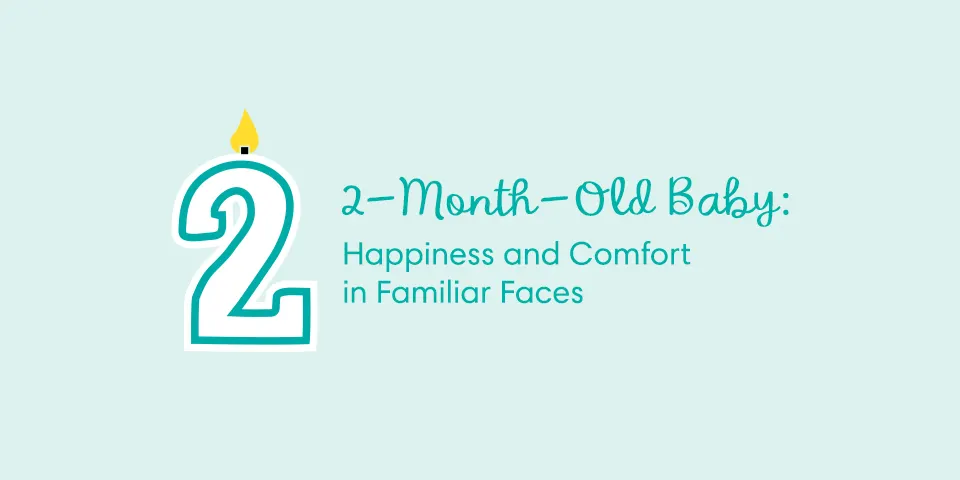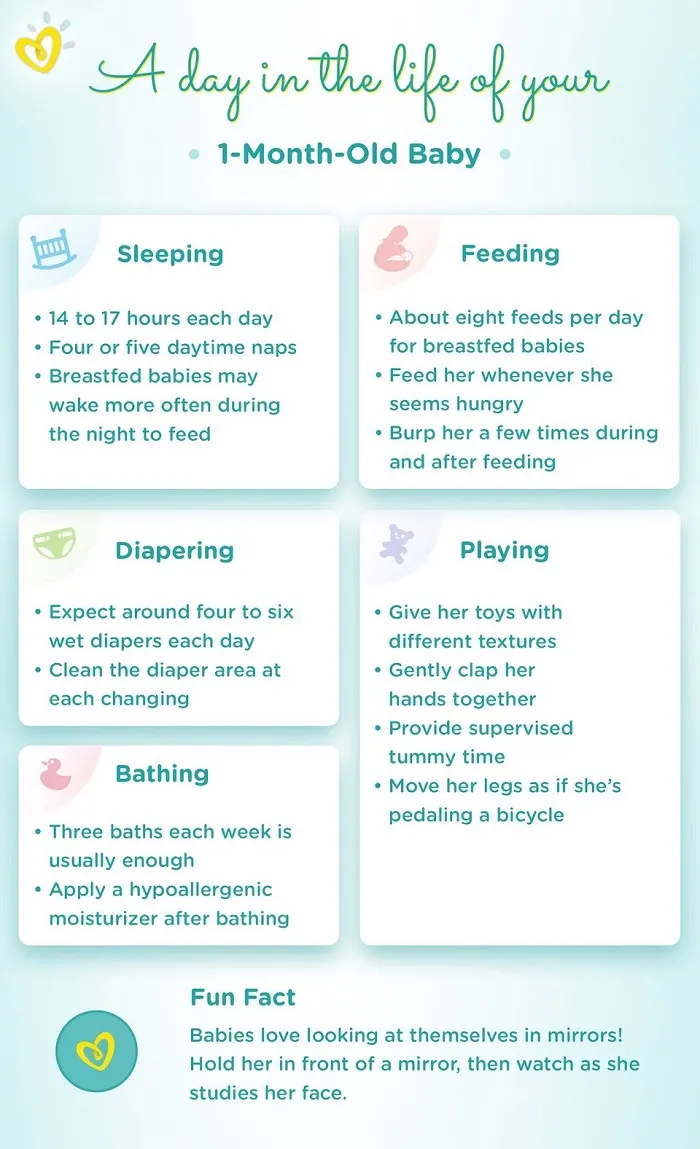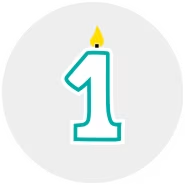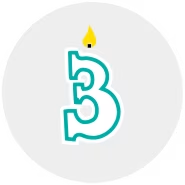2-Month-Old Baby: Happiness and Comfort in Familiar Faces
Dear mom-dad, your newborn baby isn't so little anymore. With so many exciting developmental and growth milestones yet to be achieved, your little wonder will soon be a 2-month-old baby. We have curated a preview of some of the 2-month-old baby milestones you wouldn't want to miss out on! We have also covered common health concerns and how you can deal with them. This guide also talks about the things worth noting if you will be returning to work soon so that the transition is smooth for you and your baby. Keep reading to know it all!

Baby Development Milestones
The upcoming months are going to be exciting as your baby slowly becomes more aware of the world. Here are a few of the baby development stages your 2-month-old may be catching up on.
Growth and Physical Development: Some basic changes
During the initial months after birth, newborn babies usually grow about 2 to 4 inches in height and put on about 650 to 900 grams weight every month. Your doctor will keep track of the baby's growth rate at every check-up to make sure your little one is doing well. This is done by noting the height, weight, and head circumference of your 2-month baby.
During this month, the soft spots called fontanelles on your baby’s head begin to harden as the bones of your little one's head begin fusing.
Read more on the usage of baby growth charts during the first 24 months.
It's Time for Some Mani-Pedi Care
As your baby grows, you may have noticed your baby's nails growing too fast. You might be worried about your baby scratching and hurting himself. So, you will have to clip or file those teeny-tiny fingernails about once a week and toenails about twice a month. Here's a small list of tips that might help you:
Use baby nail clippers or scissors
You should clip your baby's nails when he's asleep or after a relaxing bath, as his hands will not be moving much
To safely clip the nails, push down on the fingertip skin
After clipping the nails, use a soft nail file to smoothen any rough edges
If you're hesitant about safely cutting your baby's nails, you can talk to your baby's doctor to show you how.
Moreover, massaging your little one may help you both bond. For more information, read this wonderful article on baby massage benefits.
Senses: The World is Full of Colours
As your baby looks at you and the surrounding, he will start recognising the objects. You will notice your baby recognising familiar human faces more often, especially both of yours - mom and dad. Initially, you may have seen your baby staring at simple patterns with straight lines mostly. However, soon your baby will be drawn to circular shapes and patterns like the bull's-eyes and spirals. Your baby has also started to see colours better.
If you take your baby out for walks, you will notice him enjoying and looking out from the stroller. You can help improve your baby's senses by identifying the different objects for him to further develop his recognition skills, especially the ones that catch his eye.
Movement: A Step Toward Independence
Most of your baby's movements may still be reflexive, but the tiny one will gradually gain control of what he does. Your baby may seem less active for a while as some of the initial reflexes fade, but you will soon notice his new and more purposeful movements. The kicks that he had started practising last month will have more force now. Slowly, as he progresses towards the coming weeks, you will see that he can control bending and straightening his knees. Holding your baby upright as his feet touch the ground, he might crouch down and then stand. Soon, he will realise that he can bounce.
Your little one's hand and finger skills are developing too. You may see your baby with his hand unclenched most of the time, and he may seem fascinated by his hands when they pass by in front of him. Your baby will also be able to bring his hand to his mouth. In the beginning, it might happen accidentally, but eventually, your baby will put his hands in the mouth on purpose as he will find sucking his knuckles to be soothing. When you hand your baby a rattle, he might hold onto it, shake it, and drop it when bored.
By this month or next, your baby will also be able to push himself up on his arms and hold his chest and head up, thanks to all that tummy time. It is indeed a piece of big news, as it is one step toward your little one's greater independence. With this skill, your baby will now be able to look around at anything that holds his attention, even when he's lying on his belly.
Personality: Hear Your Baby's 'Muh-muh' and 'Bah-bah'
While your baby continues to grow, you will be introduced to his personality more and more every day. You will notice it through his way of communication – facial expressions, vocals, and gestures. If you smile at your baby, you will see his happiness where he smiles right back at you. By now, he may have started happily amusing himself with all kinds of strange new sounds. You may even hear his aahs, muh-muh, bah-bah, and oohs.
If your baby does this, have conversations with him. Repeat these sounds after him. But also use real words when talking to him. As time progresses, he will realise that conversation is a two-way street, and each person takes turns to contribute. Soon, your little one will become more alert to your voice and tone, and be able to recognise your mood by your way of talking. Through your voice, your baby will also understand what is coming. Hence, talk to him while performing little tasks; tell him what you are doing as you change his diaper, talk to him when out for a walk, or even while bathing him.
In no time, you will also see your baby squealing and laughing in joy. However, don't be surprised when your baby doesn't respond to strangers. Since both you parents and other family members he’s used to seeing on a daily basis, he feels secure and safe around you all. Keep in mind that similar to adults, your baby too has his preferences!

How to Encourage Your Baby's Development
Playing and interacting with your baby has a positive impact on your baby's early learning and brain development. Here are a few activities that might help enhance your baby's development:
Read to your baby
Although your baby doesn't understand all your words completely, he is listening to the sounds you make as he learns about tone and pacing. You can read the same book over and over, as babies love repetition.
Have a chat
You have been waiting for so long to hear your baby talk, so now is the time to respond to his coos and aahs. Start talking to him by telling him what you are up to or what tasks are you performing. Do not interrupt or look away when he is talking. When he talks and you pay attention, it makes him feel that his voice is important for you - and this will help build trust.
Tummy time
Make sure your baby gets short periods of tummy time every day, as it will help strengthen his neck, arm, and shoulder muscles. For tummy time, place your baby on his tummy on a firm surface, and ensure you are watching over him to avoid any mishaps.
Introduce a variety of sounds
Get your baby toys that make different sounds when touched or play music for him. Make sure your baby listens to these sounds every day. You can do so by placing him safely near you while doing household chores. Moreover, the sound of you tidying and doing chores may probably fascinate him.

Feeding Your 2-Month-Old Baby
Usually, a 2-month-old baby eats about six to eight times a day, so make sure you feed your baby whenever he is hungry, which may be often. To understand when your baby is ready to eat, look for signs – your baby will make sucking motions, move the hands to his mouth, whimper, or flex his arms and hands. Make sure you don't overfeed your baby and keep an eye on signs that say he is full. When he has had enough, he will slow down or stop sucking or turn away. If your baby tends to doze off after feeding but is alert, content and active between the feeds, it is a sign that your baby is eating well. Read more about newborn baby feeding to know more about breastfeeding tips.
By this stage, skipping on one middle-of-the-night feed should not be a problem, as your little one's stomach capacity is growing, and he may not be hungry till early morning. Do you know there are multiple benefits of burping your baby? Learn all about benefits and the right way to burp your baby.
Tracking wet and dirty diapers
One of the many ways to know whether your baby is healthy and feeding enough is through the number of diapers you change. However, remember that every baby is unique and may pee anytime, then it can be once every couple of hours or only once every four to six hours. If your baby wets less than six diapers, then it may be a sign of mild dehydration. So, it is essential that you pay attention to how many diaper changes your baby goes through. Given all the diapering going on, keep in mind that your baby’s fragile skin needs soft, comfortable diapers — such as Pampers Premium Care diapers for newborn.
A major drop in the number of wet diapers or your baby's dry mouth may indicate that he is dehydrated. In case of any doubt, it is always best to speak to your baby's doctor. There is no fixed number for poopy diapers either. 2-month-old babies can poop anytime, then be it several times a day or only once a week. So, worry not if your baby is well and poops less than usual, but the stools are soft, it may not be a cause for concern. In case if you are worried, consult your baby's doctor for a check-up. Read on to know more about how to change a diaper, and you will surely get the hang of it. You can also check the ultimate diaper bag checklist for you newborn baby.
By now, you must have known that your baby needs plenty of diapers. So, don't forget to download the Pampers App to get great rewards for all those diapers you're buying. You can also buy from a wide range of Pampers diapers online like Pampers New Baby or Pampers Baby-Dry. You can select the perfect fit for your baby using the diaper size tool.

How Much Sleep Does a 2-Month-Old Baby Need?
At 2 months old, your baby is sleeping for about 14 to 17 hours over 24 hours. During the day, your little one may spend more time being alert and awake. Although your baby may get to have fewer naps, they might be a little longer. During this stage, some babies can even sleep through the night for about six to eight hours at a stretch.
Good sleep routines, regular bedtimes and naptimes, and restful sleeping periods contribute to your baby's general health and wellbeing, giving your little one an excellent start in life. Although evening routines can take a while to establish, you can support your baby to move in the right direction by setting night-time feeds as quiet as possible. For this, you can keep the lighting low, avoid speaking much or loudly and put your baby back to sleep on his back after the feeding and a quick diaper change. Watch these great tips for a good night's sleep for more details.

A Day in the Life of Your Baby
Although your 2-month-old baby's daily schedule includes sleeping, feeding, bathing, and playing, here's a quick example of a typical day in your baby's life:
How to Deal with Skin Problems
Here's how you can tackle some of the common skin conditions:
Diaper rash
When a wet or soiled diaper touches your baby's skin for very long, it can lead to red rashes around the diaper area. Change wet or soiled diapers immediately, clean your baby's skin with wipes during every change, and let your baby's skin air dry whenever possible to avoid or clear up a diaper rash. This routine will not only clear up any existing rash but also prevent it from reoccurring. For more tips, read about diaper rash treatment and prevention tips.
Heat rash
You will notice tiny, red bumps usually on the neck, arms, legs, or diaper area typically during the hot and humid weather. Rather than applying skin ointments, cool the affected area with water, completely dry the skin, and dress your baby in cool, dry clothing. Make sure you keep your baby out of the heat. These tips will heal the heat rash in a few days. Read more about baby heat rash and its remedies.
Eczema
Eczema usually occurs in the crooks of the elbows and knees in the form of red, itchy, scaly patches. On diagnosis, your baby's doctor will recommend suitable treatment options. You can use mild, unscented baby soaps for bathing your baby and washing your baby's clothes and sheets. It is best to dress your baby in soft clothes so that they don't prickle. If possible, bathe your little one thrice a week at the most. Read more about baby eczema and what to do when your baby has eczema.
Coughing
Your 2-month-old baby's coughing can be a sign of the airways being irritated. Many respiratory illnesses, like common cold or pneumonia, can trigger a cough. If you are in doubt, you can reach out to your baby's doctor; however, if your baby has a fever or difficulty in breathing along with coughing, call your baby's doctor immediately.
Allergies
If your baby seems fussy or cries excessively, develops a rash, has very watery or bloody poops, or vomits up most of the food, it can be a potential sign of a food allergy or sensitivity. Your baby's doctor will explore potential causes before making a diagnosis.
Did you know, your baby’s poop can tell a lot about your baby’s health? Learn all about baby poop with this ultimate baby poop guide.

FAQs at a Glance
Typically, 2-month-old babies can see at least 12 inches away or maybe even up to 2 feet or more. You will know that your baby can see further when he smiles as you pass by from the other side of the room or when you see him observing one of the toys on the floor. In the next few months, you might notice your baby staring at the window - this means that your baby's distance vision has improved.

Your Life as a Parent: Before Returning to Work
Based on your situation, you may need to consider various factors before deciding if and when you should go back to work. These may include your maternity leave options, finances, and other general family considerations. Give yourself some flexibility if possible because when the times comes, you may change your mind about your return to work. Remember, it is normal that whenever you return to work, you may feel sad, anxious, or concerned about your baby's adjustment. If you and your partner can't stay at home with the baby, it is best to find childcare. Make sure you feel comfortable with the childcare you choose and that your baby flourishes. It is also best to get additional help at home so that you can spend some precious time with your baby without any additional distractions.
Organizing Child Care
There are multiple sources and forms of childcare, which you could consider. These are:
Your parents, extended family members or other relatives
A babysitter
A day-care centre
In-home care – only for your baby or in a group with other children
A nanny
A combination of the above.
While searching for childcare, remember that it is essential to make sure your little one is happy and developing well under the care you have chosen. Talk to other parents or your baby's doctor for referrals. You can also speak to potential caregivers at length, observe them with your baby for a couple of days, and check their references and perform background checks - always trust your instincts. Make sure you always keep an eye on your baby's progress and re-evaluate your choice if needed.
Expressing Breast Milk at Work
Going back to work can be stressful for a few women and may reduce their breast milk supply, and you may not be able to pump in the required amounts. Ideally, your employer should allow you time and a place apart from the bathroom to express breast milk until your baby turns a year old. If you are concerned about your milk supply running low, read on how to increase breast milk supply. You can also contact your doctor or lactation consultant for help.
Finding Help at Home
Whether you return to work or you simply need additional help, you may require help with cooking, household chores, or errands. Here are some things to remember:
Ensure you know a person you trust who will share the load and not add to it
Know when you will need help and ensure that the helper can reliably stand by this schedule
Be clear about your requirements, and it is always better to have them in writing
Ask for notice or prior warning if your helper can't make it or is falling sick
It is better to have a plan B like a babysitter or a trustworthy neighbour you can call to fill in at the last minute
Always do a background check, and do not forget to check for a valid ID
In case the person's role includes caring for your baby, you can ask them to take a small baby first aid course.





